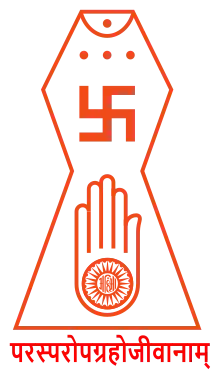| Pajjusana | |
|---|---|
| Also called | Paryushana (Shvetambara) & Das Lakshana (Digambara) |
| Observed by | Jains |
| Celebrations | 8 days (Shvetambara) 10 days (Digambara) |
| Observances | Austerities, Fasting, Listening to Pravachan by monks, Meditation, Singing Stavans, Going to the Jain Temple etc |
| Date | Bhadrapada Krishna 12 to Bhadrapada Shukla 4 (Shvetambara) Bhadrapada Shukla 5 to Bhadrapada Shukla 14 (Digambara) |
| Frequency | Annually |
| Related to | Samvatsari (Shvetambara) Kshamavani (Digambara) |
| Part of a series on |
| Jainism |
|---|
 |
Paryushana (Pajjusana) is an important annual holy event for Jains and is celebrated in the month of August or September in the lunisolar Hindu calendar.
The festival commences on different days and differs in duration for the Digambara and the Shwetambara sects, and culminates in the forgiveness day; Kshamavani and Samvatsari respectively. [1][2] Jains increase their level of spiritual intensity using fasting, prayer and meditation.[3][4] The five main vows of Jainism are emphasized during this time.[5] Followers are encouraged to practice as per one's abilities and desires.
The duration of Paryushana lasts over 8 days for Śvētāmbara Jains and 10 days for Jains belonging to the Digambara sect. It is called as Das Lakshana by Digambara Jains, a 10-day spiritual festival that starts when Paryushan of Śvētāmbara ends, on the Samvatsari. The celebration of Samvatsari or Kshamavani (forgiveness) is the same for both the sects.
This festival is important for Jains as it is celebrated once in a year. Jain festivals are characterized by renunciation, austerities, study of the scriptures, repetition of holy hymns, meditation and expression of devotion to the divine. Many austerities are followed everyday during this period. In any of the austere practices, Chauvihar is a must, that is any type of food or water is restricted starting from the previous sunset to the next day sunrise. Not only vegetables grown underground but consumption of any vegetables or fruits is also restricted during Paryushana.
Meaning
Paryushana means "abiding and coming together". It is a time when the Jains take on vows of austerities, study and fasting.[6][7]
History of Pajjusana & Kalpasutra
Observances
Date
Dashlakshana (Digambara)
Social Impact
See also
References
Citations
- ↑ Dalal 2010, p. 164.
- 1 2 Katju, Justice Markandey (14 March 2008), Supreme Court Judgement regarding Closure of Slaughter houses during Paryushan, The Supreme Court of India
- ↑ Roy, Christian (2005), Traditional festivals: a multicultural encyclopedia, Volume 1, ABC-CLIO, p. 356, ISBN 1-57607-089-1
- 1 2 Dhanpal Jain (4 September 2008), "Paryushan Parva, festival of forgiveness", The Times of India
- ↑ Melton 2011, p. 673.
- ↑ Cort 1995, p. 160.
- ↑ "Jain festival of Paryushan finds many admirers", The Times of India, 1 September 2016
- 1 2 "Jains pray for peace, brotherhood", The Hindu, 13 September 2007, archived from the original on 7 November 2012
- 1 2 Doniger 1999, p. 555.
- ↑ Preeti Srivastav (31 August 2008). "Request for Forgiveness". The Indian Express. Archived from the original on 1 October 2012.
- ↑ Jain 2011, p. 128.
- ↑ POKHAREL, KRISHNA (11 September 2015). "Why Mumbai Is Banning Meat This Weekend". Wall Street Journal. Retrieved 11 September 2015.
Sources
- Doniger, Wendy, ed. (1999), Encyclopedia of World Religions, Merriam-Webster, ISBN 0-87779-044-2
- Jain, Champat Rai (1917), Ratnakaranda Sravakachar of Acharya Samantabhadra
- Jaina (1992), Pratikraman
- Nirvana Sagar (1986), Pratikramana-sutra
_celebrations%252C_New_York_City_Jain_temple.JPG.webp)